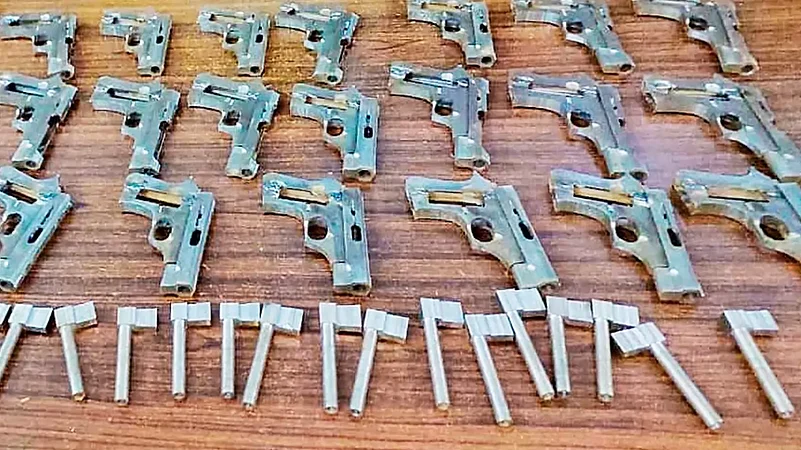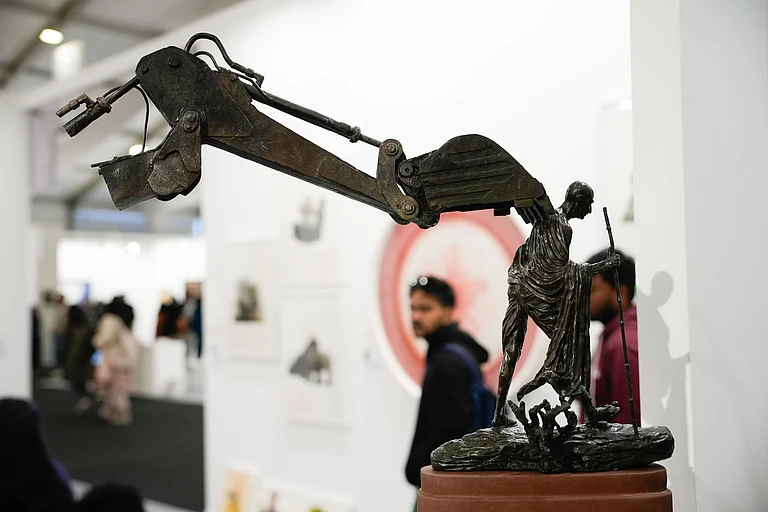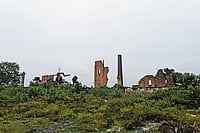On May 24, when a large contingent of police personnel reached a desolate spot near Kartahan Jagdishpur village in Vaishali district of Bihar, about 40 kilometres from state capital Patna, the villagers were taken by surprise.
“We had never seen such a heavy police presence in our village ever. We had no idea what was going on,” says a middle-aged local, who did not wish to be named. The location, after all, was very nondescript. Close to the place where the police had arrived, a fly ash-based brick kiln was smouldering.
What happened after a few minutes of raid stumped the locals. The police unearthed an illegal, small-scale firearm factory. “The land where the factory was running belonged to a local, who is a very social and well-respected person,” says Pramod Patel, a resident of the village. “It was quite shocking that a gun factory was running in our backyard and we had absolutely no idea,” he adds.
Illegal arms from this factory were supplied not just in Bihar but in West Bengal as well.
“A well-organised racket was in place. The factory would make firearms based on the demand put by local buyers who would then sell the procured arms to their inter-state clients,” a police officer from Kartahan police station, who was part of the team that raided the factory, says.
The raid and the subsequent discovery may have surprised the locals, but for Bihar police, busting illegal gun factories mushrooming across the state has become a routine. In the past five months, more than a dozen illegal gun factories have been busted in Banka, Purnia, Rohtas, Gopalganj, Saran, Patna and other districts.
What’s concerning for the police department is that earlier these factories were mostly concentrated in and around Munger. But gradually, over the years, the action has shifted away from ‘The City of Guns’.
Munger No Longer a Hub
Munger’s tryst with guns goes back to the mid-18th century when Mir Qasim Ali, the Nawab of Bengal, had found explosive potential in the district's soil and had set up gun factories there.
After independence, the Indian government started controlling these units and hence the licensing system began. Only those factories that had a valid license to manufacture single and double-barrel guns were allowed to operate. All over India, only 60 gun factories had these licenses. Out of these, 36 were in Munger.
However, with time, illegal firearms factories also started running parallelly to the licensed gun factories, and gradually, their market became many times bigger than the licensed gun market. Now, licensed gun manufacturing units can be counted on fingers, but more and more illegal arms factories are coming up—what’s legal is dying, and what’s illegal is mushrooming.
As per the National Crime Records Bureau’s (NCRB) 2022 report, 4,035 illegal arms were seized by the police in Bihar in 2021, which is the fourth-highest in terms of recover after Uttar Pradesh (40,212), Madhya Pradesh (13,097) and Rajasthan (6,790). In 2020, 3,166 illegal arms were seized in the state.
Tedious Process of License Procurement
The primary reason behind this is that licensed gun factories used to make only single and double-barrel guns and they were sold only to those who had arms licenses.
Currently, only three legal gun factories are operating in Munger. One of these is Pfizer & Company, which started operating in the sixties. Saurabh Nidhi, the proprietor of the company, says: “The local administration has been very strict in allotting gun licenses. People have to give a lot of explanations and justifications to get these licenses. Even after putting in so much effort, it’s not guaranteed that you will get a license.”
He adds: “If new licenses are not issued, then how will a factory owner survive and expand his business? There was low demand for licensed guns in the market, so most of the factories closed and the workers had to look for odd jobs for survival.”
Awadhesh Kumar, a Munger-based lawyer, who has a keen interest in firearms, however, believes that apart from the difficulty in getting licenses, another reason behind the shutdown was that the legal factories failed to change their technology with changing times.
“Gone are the days of the single and double bore guns. Now there is a demand for firearms like pistols and revolvers. The industry could not meet the demand for new firearms and it was destined to fall,” he says.
Mushrooming Illegal Factories
While the licensed arms manufacturing units closed due to the lack of demand and redundant technology, Munger's massive illegal gun factories market is gradually going bust after the police department swung into action.
These factories were denting Munger’s image, so the district police were tasked with raiding and shutting all such factories on a war footing.
In the recent past, some illegal gun factories were busted in Bihar after the Kolkata Special Task Force (STF) had alerted the Bihar STF. On April 4, the Kolkata STF and Bihar STF, in a joint operation, unearthed an illegal gun factory in Barabad of Banka district. The raid at Vaishali’s Kartahan Jagdishpur village was also a joint operation between Kolkata and Bihar STF.
While illegal firearms are still manufactured here, Munger is no longer the hub.
A Kolkata-based journalist, who has been covering the crime beat for a long time, said on the condition of anonymity: “Earlier, most of the illegal arms recovered by the Kolkata Police used to be 'Munger made', but now firearms are being procured from different districts of Bihar as well.”
A Munger-based journalist informed: “Currently, most of the assembling happens here. People from neighboring West Bengal visit Munger with arms parts and get them assembled here. The railway connectivity between the two states is an added advantage.”
Although Munger may no longer be a hub of illegal weapons, the expertise of people who were earlier working in these factories is in demand. Many of these workers were found working in factories that were busted in different cities in Bihar, as well as in Delhi and Uttar Pradesh.
“When police raids were rampant in Munger, many illegal factories shut down. These unemployed workers struggled to survive. As they had no other expertise other than making firearms, they were engaged in illegal arms factories in other districts,” says Kumar.
In 2013, a bizarre news story about Bihar grabbed national headlines. The police had found that a few unemployed youths from Munger, who were experts in making firearms, had set up illegal gun factories taking loans under Pradhan Mantri Rozgar Yojana (PMRY).
Huge Demand for Illegal Guns
Despite the ongoing raids, the illegal arms industry is flourishing and the main reason is the huge demand.
Experts say, firearms are status symbols for some. Many people keep them for safety purposes. Apart from this, illegal firearms are used by criminals as well as goons of political parties, especially during elections.
But getting a license is difficult due to red tapism. That's why people end up buying and keeping illegally-made weapons.
Mostly kattas and pistols are manufactured in illegal arms factories. These weapons are very small in size but are equally effective. A katta can be bought for Rs 1,000-1,500. These small arms are easy to carry and hide and are preferred by criminals.
Recently, after unearthing an illegal arms factory in the rural area of Patna, a senior police officer said: “These days, illegal firearms are being used in most of the criminal cases (in the state).” The local suppliers are working overtime to meet demand and illegal factories are running in full swing. After all, a gun factory does not need much space, funds and huge equipment. One just needs an access to a lathe machine, and woods and pipes.
With such huge demand, it will be difficult to keep a tab on illegal factories that are coming up on a daily basis. What’s also needed is a policy change. Unless alternate livelihood opportunities are provided to those who are a part of this network, these people will never be able to come out of the vicious cycle.
Umesh Kumar Ray is a bihar-based independent journalist



























